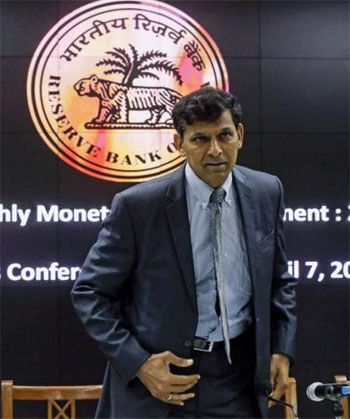The 'Rating Level 4' means that the financial market regulators have all regulatory measures "fully in force"
 India's financial market regulatory framework today got the top-most ratings from the global bodies of banking and capital market regulators, with RBI and Sebi being rated better than their peers in China and the US.
India's financial market regulatory framework today got the top-most ratings from the global bodies of banking and capital market regulators, with RBI and Sebi being rated better than their peers in China and the US.
In the latest global 'assessment study' of the regulatory framework for financial market infrastructures across the world, only six countries, including India, have got the highest score of '4' for all eight parameters on a scale of one to four.
The other five countries are Australia, Brazil, Hong Kong, Japan and Singapore.
The 'Rating Level 4' means that the financial market regulators -- Reserve Bank of India (RBI) and the Securities and Exchange Board of India (Sebi) -- have all regulatory measures "fully in force".
The annual assessment studies the implementation status of the international Principles for Financial Market Infrastructure (PFMIs) in various countries.
These PFMIs work as global standards for the financial sector entities across the world and have been finalised by the International Organisation of Securities Commissions (IOSCO) and the Bank for International Settlements (BIS).
IOSCO is a global grouping of capital markets regulators in different countries, including Sebi, while BIS is known as the central bank for all central banks across the world.
The study showed that Sebi and RBI have put in place all necessary regulations for the PFMIs, while they also "have a legal capacity to implement the responsibilities" outlined under these global standards.
As per the latest assessment of 28 jurisdictions, the US has scored the top-most rating of 4 on five out of total eight parameters, while China has got three top-most scores.
European Union scored the top rating on six parameters, while ratings for two were 'Not Available'.
The assessment took into account regulations for central counter-parties, trade repositories, payment systems, central securities depositories and securities settlement systems.
India has scored top ratings on all these counts.
The latest findings are based on the 'second update' of the first-level assessment that looked at jurisdictions having completed the process of adopting the legislation, regulations and other policies that would enable them to implement the principles and responsibilities related to financial market infrastructures.
Going by the report, all 28 jurisdictions have made "good progress" since the previous update in May 2014.
"In particular, the gap in the progress on implementation measures applicable to central securities depositories and securities settlement systems vis-a-vis other types of FMI has now closed," BIS and IOSCO said in a joint statement.
The next update of the first-level assessments will be conducted next year.
Alongside, the two global bodies are also continuing to monitor jurisdictions' progress for the second and third level assessments and the results from these assessments will be published in 2015-2016.






 © 2025
© 2025